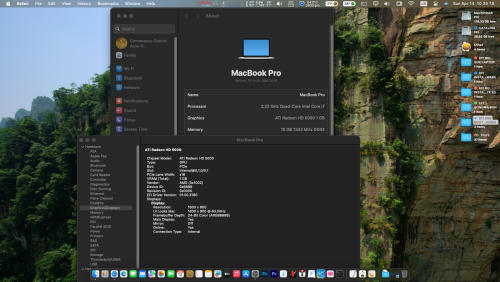Mashugly interviewed an Intel employee:
I had the chance recently to speak with an Intel employee working in the Fab. department where Apple’s next-gen Intel chips are being made. He spoke under condition of anonymity, giving only his opinions and not the official sentiments of Intel. His credibility is sterling.
He gave us his opinions and insider’s perspective on Apple’s move to Intel. Note that while he states that there are many ways that Apple could restrict their OS, the assumption of he and his colleagues is that Apple will use stock production chips. But that’s not all he had to say... read on.
1. What is the atmosphere in your dept? Excitement? Slight nervousness?
First, let me give you a bit better understanding of what it is I do. I'm a technician in the "FAB", that is one of the factories where the processors are manufactured. When I see the chips they are still in complete wafers and several weeks if not months from being what you would know as the chip in your computer. People in my department, and the rest of the FAB, are concerned with keeping our tools running and processing the wafers to get them out of the FAB. We manufacture several different processor types (i.e. laptop, desktop and server) so there isn't really a whole lot of attention paid to what product is running on a tool at any given time.
What I can tell you is that in the seven plus years I have been working for Intel this is the first time in the past few years...
...that I have seen the majority of the people in the FAB excited about the direction the company is moving in. The Apple deal is part of that but the confidence in our new CEO and our new products has a lot more to do with it. Intel has always had a mind set of "we can achieve anything we set our minds to". With the resources the company has for the most part that is true. There are not many other chip companies that can afford to spend billions of dollars to develop new technologies. One thing that people totally overlook in the whole Intel vs. AMD thing is that in the past few years Intel has completely redesigned its chips from the core out. There were a lot of problems to overcome in making that happen and that is the source of the majority of the performance issues that people have seen in Intel chips during that time period. AMD is still designing on a processor core that is getting to the end of it's usable life cycle. It will continue to get harder and harder for them to get more performance out of this older design while Intel will start to fine tune it's newer designs.
2. Will the parts that are used in the first Intel Macs be generic P4s or will they be a special processor made just for Apple?
I do not know for sure but I would highly doubt that we are making special parts for Apple. It's just too expensive to design a special part, work out the manufacturing bugs and then ramp it into production. Again you have to look at it from the Intel point of view. We manufacture hundreds of millions of processors each year. While we are proud of the fact that Apple is using our chips they will be a very small percentage of the product we make. I would be more inclined to believe that during the design cycle of our new chips input from Apple was used to decide what features would be included in the final design. As we all have now learned Apple and Intel have been talking for a long time about a lot of things. Also Apple has been working on porting their OS to an x86 platform for at least a few years now so I'm sure there were a lot of ideas exchanged over that time.
3. How did you (and your colleagues) react to the news of OS X being hacked to normal hardware? About breaking the TPM?
I didn't know about it until I saw what you had reported on it. I'm not surprised that there is a hack floating around out there. Not many people at Intel are really into Macs. You have to remember that until very recently they were the competition. I still get some funny looks when I walk around with my iPod. ![]()
4. Is Apple planning on using the TPM or something similar to restrict OS X to their own hardware in the final product?
No idea about this one. There are many things that can actually be built right into the chip that could be used to restrict what OS is ran with it. Each chip has it's own ID and I'm sure it would be possible for Intel to use a special convention for the ID code for chips intended to go in Apple machines. Features such as clock speed and amounts of cache are actually set when the chip is e-tested and they see how that chip performs. When they come out of the Fab there is no difference between 3 gig P4 and a 3.6 gig P4. It's how the chip performs at e-test that decides what speed it will be certified at and the final configuration is burned in to the chip at e-test.
5. Are most of the people you work with Apple fans? Or are they just working in that Dept. because they were assigned to it?
Again reference the fact that we don't make chips just for Apple at the Fab I work in. As far as being fans I would say that most people are happy that we are working with Apple but it's not the most exciting thing in the world to them. Another big misconception that people have about us folks at Intel is that we are all big computer geeks. I have actually known a few people who work for the company that don't even have computers at home.
6. In your opinion, who will benefit most from the Intel-Apple partnership?
I think both companies will benefit in the short and long term. How much comes out of this is mostly in Apple's hands if you ask me. They are in a position where they have to make some very important decisions about Apple's future. Once Intel chips go into Macs there will be no difference between a Mac and a Dell but the OS running on the machine. If they decide to stay with their image of the "rebel" company that prides it self on doing things differently then there is no way that they will separate their OS from their machines and sell it on it's own. If they do that, they will put themselves in competition with all the other PC makers out there and they will learn what the rest have learned. Profit margins are very small and to make any money you have to sell a lot of computers - way more than 4 or 5 percent of the market. The other thing that selling their OS by itself will do is get them the attention of all the hacker and virus writers that until now have left them alone. If Apple had as many people trying to break it's code as Windows does I don't think that it would keep it's rep for being so stable and secure for very long. On the other hand if they do decide to try and go big in the market and expand their share by opening up their OS to be ran on PCs Intel is a great partner to have from the perspective of supplying parts and supporting their new design ideas. As I've said before, I think Apple will be one of our most demanding customers but that will only make Intel better and force us to move in new directions.
7. What do you think was so attractive about Intel to Apple? I mean, other than the obvious stuff (like what Jobs said about lower wattage) what can you offer Apple that IBM/PPC couldn't?
Since I'm going under the assumption that Apple will be using normal production chips from us I think that Apple likes the idea of having their chips made by a company with such a strong history in pushing the computer industry and also the fact that making processors is our first and most important job. It is what defines Intel so we are going to be sure to do everything we can to make things better all the time. IBM is such a big company and involved in so many different things that making chips for Apple was just one more thing on their to do list. I don't think it was a real priority for them. Also we can supply more chips than anyone else could.
8. Any ideas on what they're planning on calling the chips for Apple? If not a final name, what codename are you using?
No word on that yet at all.
Thanks for your time!









Recommended Comments